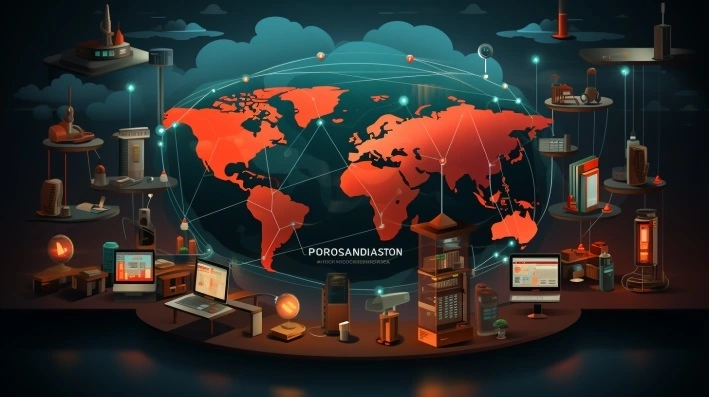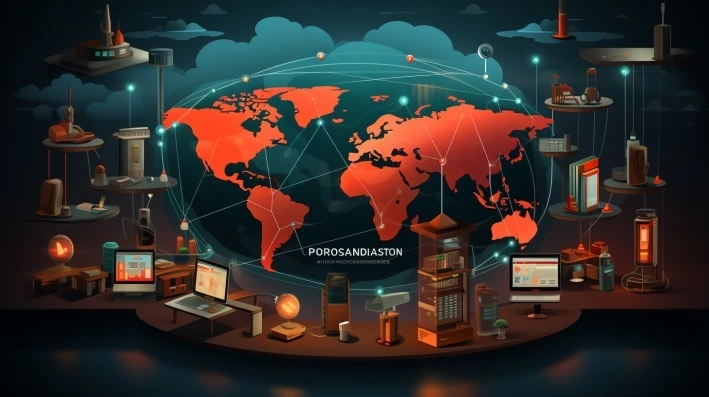
Table of Contents
In today’s hyperconnected world, where data is the new currency and online threats lurk around every virtual corner, ensuring your digital security and privacy has become more critical than ever. This is where VPN, short for Virtual Private Network, emerges as your digital guardian angel.
VPN – three simple letters that hold the key to a safer, more private, and unrestricted online experience. If you’ve ever wondered how to shield your online presence from prying eyes, access geo-restricted content effortlessly, or supercharge your online gaming, you’ve ventured into the exciting realm of VPNs.
In this comprehensive guide, we’ll unravel the mysteries of VPNs and equip you with the knowledge to choose the best VPN service that suits your needs. We’ll dive into the nuances of this technology, explore the best VPN options for various devices, and answer burning questions such as, “What is the best VPN for iPhone?” and “What is the best VPN for gaming?”
So, fasten your digital seatbelt, and let’s embark on a thrilling journey through the world of VPNs, where privacy, security, and endless possibilities await.
What is a VPN?

A VPN, or Virtual Private Network, is a technology that establishes a secure, encrypted connection between a user’s device (computer, smartphone, or tablet) and a remote server operated by a VPN provider. VPNs serve to create a point-to-point tunnel that encrypts the user’s data, masks their IP address, and enables them to access the internet securely and privately. Here’s a comprehensive explanation:
Definition of VPN (Virtual Private Network)
A VPN (Virtual Private Network) is a technology that establishes a secure, encrypted connection over the internet between a user’s device and a remote server operated by a VPN service provider. This connection creates a virtual tunnel through which the user’s data is transmitted, protecting it from unauthorized access and providing anonymity and security online.
Basic Principles of How VPNs Work:
VPN technology operates on the following basic principles:
- Encryption: VPNs use encryption protocols to scramble the user’s data into unreadable code before it’s transmitted over the internet. This encryption ensures that even if intercepted, the data remains secure and private.
- Remote Server: When a user connects to a VPN, their internet traffic is redirected through a remote server located in a different geographical location. This server acts as an intermediary between the user and the websites or online services they access.
- IP Address Masking: VPNs hide the user’s real IP address and assign them a new one based on the location of the VPN server they’re connected to. This masking enhances online privacy and anonymity.
- Secure Tunneling: VPNs establish a secure tunnel between the user’s device and the remote server. This tunnel ensures that data transmitted between the two endpoints is protected from external monitoring and interception.
Primary Purposes of Using a VPN:
The primary purposes of using a VPN are as follows:
- Privacy Protection: VPNs shield users from prying eyes by encrypting their internet traffic. This prevents ISPs, government agencies, hackers, and advertisers from monitoring and tracking their online activities.
- Security: VPNs enhance the security of data transmitted over public networks, such as Wi-Fi hotspots. They protect against potential threats like data theft, identity theft, and cyberattacks.
- Access to Restricted Content: VPNs allow users to bypass geo-restrictions and access region-locked content or websites. By connecting to a server in a different location, users can appear as though they are browsing from that region.
- Safe Public Wi-Fi Usage: When using public Wi-Fi networks, which are often vulnerable to cyber threats, VPNs provide a secure connection. This safeguards sensitive information like login credentials and financial data.
- Anonymous Torrenting: VPNs offer anonymity when torrenting files by hiding the user’s IP address. This prevents copyright enforcement agencies from tracking torrent activity.
- Remote Work: VPNs enable remote workers to access their company’s internal network securely, making it an essential tool for businesses with remote employees.
- Bypassing Censorship: In countries with internet censorship and restrictions, VPNs can circumvent such limitations, allowing users to access blocked websites and services.
In summary, a VPN is a technology that establishes a secure and private connection between a user’s device and a remote server. It encrypts data, masks the user’s IP address, and serves various purposes, including privacy protection, security, accessing restricted content, and more.
VPN vs. Proxy: What’s the Difference?

Online privacy and security are paramount in today’s digital age, and both VPNs (Virtual Private Networks) and proxy servers are valuable tools for safeguarding your data and anonymity while browsing the internet. However, they have distinct differences that make one more suitable than the other, depending on your specific needs. In this comparison, we will highlight these differences to help you make an informed choice.
| Aspect | VPN | Proxy Server |
|---|---|---|
| Encryption | VPNs use encryption to secure data. | Proxies typically lack encryption. |
| IP Address Spoofing | VPNs hide your IP and assign a new one. | Proxies hide your IP but don’t assign new. |
| Privacy and Security | VPNs offer robust privacy and security. | Proxies provide limited privacy. |
| Use Cases | Versatile for secure browsing, gaming, | Primarily used to bypass geo-restrictions |
| torrenting, and more. | and access region-locked content. | |
| Device Compatibility | VPNs have dedicated apps for various | Proxies may require manual configuration |
| platforms, ensuring convenience. | for each application or device. |
This table summarizes the key differences between VPNs and proxy servers, helping you understand which option better aligns with your privacy and security needs.
What is the Best VPN Service?

When choosing a VPN for your mobile device, whether it’s an iPhone or Android, it’s essential to prioritize factors like compatibility, features, privacy, security, speed, and pricing. To help you make an informed decision, we have compiled a detailed comparison of the top VPN providers mentioned in the articles, focusing on their suitability for iOS (iPhone) and Android devices. The following tables will provide an overview of each VPN’s key attributes, allowing you to evaluate which one aligns best with your specific needs on each platform.”
Now, let’s proceed with the tables comparing the VPNs for iPhone and Android:
What is the Best VPN for iPhone?
| VPN Provider | Compatibility | Notable Features | Privacy & Security | Speed | Price (per month) | Free Option |
|---|---|---|---|---|---|---|
| ExpressVPN | iOS | Excellent iOS app, Privacy commitment | Strong encryption | Excellent | $6.67 (12-mo plan) | No |
| Surfshark | iOS | Budget-friendly, Feature-packed | Strong encryption | Good | $2.49 (24-mo plan) | No |
| NordVPN | iOS | Reliable and secure | Strong encryption | Good | $3.49 (24-mo plan) | No |
| IPVanish | iOS | Configurable interface, Ideal for beginners | Strong encryption | Moderate | $3.99 (12-mo plan) | No |
| Proton VPN | iOS | Free option, Privacy-focused | Strong encryption | Moderate | $10 per month | Yes |
What is the Best VPN for Android?
| VPN Provider | Compatibility | Notable Features | Privacy & Security | Speed | Price (per month) | Free Option |
|---|---|---|---|---|---|---|
| ExpressVPN | Android | Outstanding Android app, Privacy commitment | Strong encryption | Excellent | $6.67 (12-mo plan) | No |
| Surfshark | Android | Budget-friendly, Feature-packed | Strong encryption | Good | $2.49 (24-mo plan) | No |
| NordVPN | Android | Reliable and secure | Strong encryption | Good | $3.49 (24-mo plan) | No |
| IPVanish | Android | Configurable interface, Ideal for beginners | Strong encryption | Moderate | $3.99 (12-mo plan) | No |
| Proton VPN | Android | Free option, Privacy-focused | Strong encryption | Moderate | $10 per month | Yes |
Please review the tables above to make an informed decision based on the specific attributes that matter most to you for both iPhone and Android.
What is the Best Free VPN
The best free VPN option, according to my research, is Proton VPN. Proton VPN is a Swiss-based open-source VPN provider known for its strong commitment to user privacy. Here are some key highlights of Proton VPN’s free offering:
- Privacy Focus: Proton VPN places a high emphasis on user privacy and security. It employs strong encryption and offers features like a kill switch, DNS leak protection, and a no-logs policy.
- Free Tier: Proton VPN provides a free tier that allows users to access their VPN services without any cost. While the free tier doesn’t include access to all of its servers or some advanced privacy features, it offers essential privacy protections.
- No Usage Limits: Unlike some free VPNs that impose data or usage limits, Proton VPN does not have such limitations. Users can enjoy the same encryption, obfuscation, and leak protection as paid users.
- Transparent and Trustworthy: Proton VPN is known for its transparency. It undergoes regular third-party security audits, enhancing trust in its ability to protect users’ privacy.
- Secure Core Servers: Proton VPN offers Secure Core servers that provide an extra layer of security, making it even more difficult for anyone to trace your online activities.
While Proton VPN’s free tier is an excellent choice for basic privacy needs, users looking for more features, server options, and faster speeds may consider their premium plans, which are priced at $10 per month or $72 per year.
Which VPN Protocol Is Best?
Selecting the right VPN protocol is a crucial decision when it comes to ensuring a secure and efficient online experience. Different VPN protocols offer varying levels of security, speed, and compatibility. To help you make an informed choice, we have compiled information on several common VPN protocols, their strengths, weaknesses, and recommended use cases. This guide will assist you in finding the most suitable protocol for your specific needs.
Now, let’s gather all the information into a comprehensive table for easy reference:
| VPN Protocol | Strengths | Weaknesses | Recommended Use Cases |
|---|---|---|---|
| OpenVPN | – High security with robust encryption (256-bit AES). | – Slower compared to some other protocols. | – Privacy-focused users. |
| L2TP/IPsec | – Good balance between security and speed. | – May not be as secure as OpenVPN. | – Situations where speed is a priority. |
| IKEv2/IPsec | – Stable and fast with quick reconnection. | – Proprietary nature and potential privacy concerns. | – Mobile users, remote work scenarios. |
| WireGuard | – Exceptional speed and simplicity. | – May not be as widely supported; less battle-tested. | – Users prioritizing speed and reliability. |
| PPTP | – Easy setup and widely supported. | – Highly insecure due to known vulnerabilities. | – Not recommended for modern VPN use. |
This table summarizes the key characteristics of each VPN protocol, helping you make an informed decision based on your specific requirements.
What is the Best VPN for Gaming?
Online gaming has become a global phenomenon, connecting players from all corners of the world in immersive virtual worlds. However, to truly enjoy the gaming experience, factors like low latency, DDoS protection, and access to region-locked content are crucial. That’s where Virtual Private Networks (VPNs) come into play. A VPN can enhance your gaming adventures by reducing lag, safeguarding you from cyber threats, and even unlocking games and content unavailable in your region. In this comprehensive guide, we’ll explore the best VPNs tailored for gaming and provide you with essential information on their server locations and speed, helping you make an informed choice for an uninterrupted and secure gaming experience.
Now, let’s proceed with the table to compare VPN services suitable for gaming:
| VPN Service | Low Latency | Server Locations | DDoS Protection | Geo-Restricted Game Access | Privacy & Security |
|---|---|---|---|---|---|
| ExpressVPN | Yes | Extensive | Yes | Yes | Strong Encryption |
| NordVPN | Yes | Vast Network | Yes | Yes | Advanced Features |
| CyberGhost | Low Latency | Global Servers | Yes | Yes | Robust Encryption |
| IPVanish | Low Latency | Many Locations | Yes | Yes | Privacy Emphasis |
| Private Internet Access (PIA) | Low Latency | Wide Range | Yes | Yes | Strict No-Logs Policy |
Note: “Low Latency” indicates whether the VPN is known for reducing lag in gaming, and “Server Locations” refers to the diversity and quantity of server locations offered.
What is the Best VPN for Streaming?

The era of streaming has revolutionized how we consume content, offering a vast array of movies, TV shows, and exclusive series at our fingertips. However, geo-restrictions can often limit what’s available in your region. This is where Virtual Private Networks (VPNs) come in, acting as your digital passport to unlock a world of entertainment. By rerouting your connection through servers in different locations, VPNs can help you access geo-restricted content on popular platforms like Netflix, Hulu, Disney+, and more. In this guide, we’ll delve into the world of streaming-friendly VPNs, recommending services that excel in unblocking geo-restricted content while prioritizing speed, security, and user experience. Whether you’re binge-watching your favorite shows or exploring new releases, these VPNs can enhance your streaming journey.
Now, let’s proceed with the recommendations for the best VPNs for streaming:
| VPN Service | Geo-Restriction Bypass | Speed & Performance | Server Locations | Compatibility | Special Features |
|---|---|---|---|---|---|
| ExpressVPN | Exceptional | High-Speed Servers | 160 Locations | All Devices | MediaStreamer DNS, Split Tunneling |
| NordVPN | Reliable | Lightning-Fast | 59 Countries | All Devices | SmartPlay, CyberSec, Double VPN |
| Surfshark | Excellent | Blazing Speeds | 65 Countries | All Devices | CleanWeb, MultiHop, Whitelister |
| CyberGhost | Effective | Fast and Stable | 90+ Countries | All Devices | Streaming Profiles, NoSpy Servers |
| Private Internet Access (PIA) | Strong | Consistent Performance | 75+ Locations | All Devices | SOCKS5 Proxy, P2P Support |
Note: These VPNs are recommended for their ability to unblock popular streaming services, speed, server diversity, and compatibility with various devices.
VPN for Privacy and Security
Protecting online privacy through VPNs is paramount in the digital age. These virtual guardians shield users from prying eyes and ensure that personal information remains confidential. Here, we delve into the importance of VPNs’ no-logs policy in securing online privacy.
The Role of VPNs in Safeguarding Online Privacy:
VPNs, or Virtual Private Networks, act as a digital shield for users. They establish an encrypted tunnel between the user’s device and a remote server, often operated by the VPN provider. This encrypted connection serves as an impenetrable fortress, preventing unauthorized access to sensitive data, including personal information, financial records, and browsing history.
VPN’s guardianship of online privacy is multifold:
- Data Encryption: Robust encryption protocols, exemplified by the 256-bit AES standard, obfuscate data during transit over the internet. This encryption thwarts the nefarious endeavors of hackers, ISPs, government agencies, or any malevolent entities seeking to intercept and decode users’ data.
- IP Address Camouflage: VPNs, in their noble quest for privacy preservation, disguise the user’s authentic IP address. Instead, they present the IP address of the VPN server, thereby concealing the user’s geographical whereabouts. This shroud makes it onerous for websites, advertisers, and cyber rogues to trace users’ online escapades.
- Circumventing Censorship and Geo-Restrictions: VPNs offer users an escape hatch from digital boundaries. By forging connections with servers in diverse global locations, users can gracefully sidestep geographical restrictions, accessing content that might otherwise remain locked behind digital gates.
- Public Wi-Fi Fortification: Public Wi-Fi networks are often infested with lurking cyber peril. Here, VPNs ascend as stalwart protectors, encrypting data transmissions and ensuring that, even in the perilous realm of unsecured public Wi-Fi, users’ confidential information remains inviolate.
- ISP Surveillance Thwarted: Internet Service Providers, those omnipresent gatekeepers of the digital realm, frequently monitor and record users’ online behavior. They may even peddle this digital dossier to advertising overlords. VPNs, with their intervention, reroute data through their servers, creating an impassable wall against ISPs’ prying eyes.
The Imperative No-Logs Policy:
A stringent no-logs policy assumes the role of a digital oath, one that assures users of their online privacy sanctity. It proclaims that the VPN provider does not maintain logs or archives of users’ online activities or personal data. The significance of this policy is profound:
- Elevated Privacy: With a no-logs policy in place, even in scenarios where legal authorities compel VPN providers to unveil information, the dearth of data ensures heightened user privacy and security.
- Trust and Transparency: VPN providers that embrace a no-logs ethos exhibit transparency and an earnest commitment to user privacy, thus fostering a relationship built on trust.
- Protection in Data Breaches: In the unfortunate event of a VPN server breach, a no-logs policy is a guardian angel. With minimal to no user data retained, the repercussions of data exposure are mitigated.
- Shielding Against Third-Party Data Sharing: VPNs staunchly adhering to no-logs policies are unable to partake in the unsavory practice of data brokerage, ensuring that users’ information remains confidential and impervious to third-party scrutiny.
In summation, VPNs are the vanguards of online privacy, upholding secrecy through data encryption, IP veiling, and unrestricted access to digital content. A stringent no-logs policy fortifies this defense, promising users the ultimate assurance of privacy and security in their digital sojourns.
Best VPN Locations for Specific Needs
When it comes to VPNs, choosing the right server location is essential for various needs. In this section, we’ll explore two specific scenarios. First, we’ll discuss the optimal VPN server locations for Warzone, highlighting how server proximity influences online gaming. Then, we’ll delve into the advantages of connecting to a VPN server in India, catering to users seeking region-specific content access and enhanced privacy. Let’s examine these recommendations:
What Is The Best VPN Location for Warzone?
| VPN Server Location | Impact on Gaming | Recommended VPN Providers |
|---|---|---|
| United States (East Coast) | Low latency, improved gameplay | ExpressVPN, NordVPN, Private Internet Access |
| Europe (London, Frankfurt) | Reduced lag, competitive advantage | ExpressVPN, NordVPN, CyberGhost |
| Asia (Tokyo, Singapore) | Smooth gaming experience | NordVPN, Private Internet Access, Surfshark |
Best VPN Server for India:
| VPN Server Location | Benefits | Recommended VPN Providers |
|---|---|---|
| India | Access to Indian content, enhanced privacy | ExpressVPN, NordVPN, CyberGhost |
| International servers with Indian options | Versatile access and global security | ExpressVPN, NordVPN, Surfshark |
Choosing the right server location can significantly improve your online experiences, whether you’re gaming or seeking online privacy and content access. These recommendations provide options tailored to specific needs.
What is the Best Free VPN in the World?
The quest for the best free VPN in the world is a common one, but it’s essential to weigh the pros and cons carefully. While free VPNs offer cost savings, they come with limitations and potential risks. In this section, we’ll delve into the advantages and drawbacks of free VPNs and recommend trustworthy free VPN services for those who prioritize privacy and security.
Pros and Cons of Using Free VPNs:
| Pros | Cons |
|---|---|
| Cost Savings: Free VPNs are budget-friendly options. | Limited Features: Free VPNs often have fewer features than their paid counterparts. |
| Privacy: They can provide basic online privacy and anonymity. | Data Caps: Many free VPNs impose data caps, restricting usage. |
| No Payment Info: No need to share payment information. | Speed and Performance: Free VPNs may be slower and less reliable. |
| Quick Setup: Easy to set up and use. | Security Risks: Some free VPNs may log data or engage in shady practices. |
| Geo-unblocking: Some free VPNs can help bypass geo-restrictions. | Ad-supported: Free VPNs may display ads or collect user data for advertising. |
| Learning Experience: Suitable for those new to VPNs. | Limited Server Locations: Free VPNs usually have fewer server locations. |
Recommended Trustworthy Free VPN Services:
- ProtonVPN: Known for its commitment to privacy and security, ProtonVPN offers a free plan with no data caps and strong encryption.
- Windscribe: Windscribe provides a free plan with a generous 10 GB monthly data limit, good privacy features, and reliable performance.
- Hide.me: Hide.me’s free plan includes 10 GB of data per month, strong encryption, and a strict no-logs policy.
- TunnelBear: While limited to 500 MB of data per month on the free plan, TunnelBear is user-friendly and respected for its commitment to privacy.
- Hotspot Shield: Hotspot Shield offers a free plan with ads and a 500 MB daily data limit but provides reliable security and access to its global network.
Remember that while these free VPNs are trustworthy, they may still have limitations and are best suited for casual use or as introductory options to VPN services. Users seeking advanced features and unlimited access may consider upgrading to a premium VPN subscription.
VPNs for Specific Applications
What is the Best VPN for Firestick?
Firestick, the popular streaming device from Amazon, has revolutionized how we consume content on our TVs. However, to truly unlock its potential and access geo-restricted or censored content, using a VPN with Firestick is essential. In this segment, we’ll discuss the advantages of integrating a VPN with Firestick and recommend some of the best VPN options tailored to this platform. Whether you’re looking for enhanced privacy, unrestricted streaming, or both, these VPNs are optimized to work seamlessly with Firestick.
| VPN Service | Features | Price (Starting From) | Get Started |
|---|---|---|---|
| ExpressVPN | Fast, secure, and excellent for streaming | $6.67/month | Get Started with ExpressVPN |
| NordVPN | High-speed servers and strong security | $3.49/month | Get Started with NordVPN |
| CyberGhost VPN | User-friendly, great for beginners | $2.29/month | Get Started with CyberGhost VPN |
| IPVanish | Reliable and perfect for Firestick | $3.75/month | Get Started with IPVanish |
| Surfshark | Unlimited connections and budget-friendly | $2.49/month | Get Started with Surfshark |
Benefits of Using a VPN with Firestick:
| Benefits | Explanation |
|---|---|
| Bypass Geo-restrictions | VPNs allow you to access geo-blocked content on Firestick by connecting to servers in different regions. This is ideal for streaming services like Netflix, Hulu, and Amazon Prime Video. |
| Privacy and Security | VPNs encrypt your internet connection, safeguarding your data from potential hackers and protecting your online privacy. |
| Prevent ISP Throttling | Some internet service providers (ISPs) throttle or limit the speed of certain online activities, such as streaming. A VPN can help bypass this throttling. |
| Access to Restricted Apps | In some regions, certain apps may be restricted or unavailable. A VPN can help you access these apps without limitations. |
| Anonymity | VPNs mask your IP address, making it harder for third parties to track your online activities. This is particularly important for users concerned about privacy. |
What is the Best VPN for Windows 10?
Windows 10 is one of the most widely used operating systems, and users often seek VPNs to enhance their online privacy and security. In this segment, we’ll explore VPN options tailored specifically for Windows 10 users, taking into account compatibility, ease of use, and overall performance.
| VPN Service | Features | Price (Starting From) | Get Started |
|---|---|---|---|
| ExpressVPN | User-friendly and excellent for streaming | $6.67/month | Get Started with ExpressVPN |
| NordVPN | Strong security and high-speed servers | $3.49/month | Get Started with NordVPN |
| CyberGhost VPN | Windows-friendly interface and affordability | $2.29/month | Get Started with CyberGhost VPN |
| IPVanish | Reliable and ideal for Windows 10 | $3.75/month | Get Started with IPVanish |
| Surfshark | Unlimited connections and budget-friendly | $2.49/month | Get Started with Surfshark |
VPN Options Tailored to Windows 10 Users:
| Features | Explanation |
|---|---|
| Compatibility | Look for VPNs that are compatible with Windows 10, offering dedicated apps or easy-to-follow setup guides. |
| Security | Ensure the VPN provides strong encryption, a kill switch, and DNS leak protection to safeguard your data on Windows 10. |
| Speed | Fast server connections are crucial for a seamless Windows 10 experience, especially for tasks like streaming and gaming. |
| User-Friendly Interface | A user-friendly interface makes it easier to navigate and use the VPN on your Windows 10 device. |
| Customer Support | Good customer support is essential for troubleshooting any issues that may arise while using the VPN on Windows 10. |
These tables provide a clear overview of the benefits of using a VPN with Firestick and Windows 10, along with recommended VPN options tailored to these platforms.
What is The Best VPN for iPhone Free?
When it comes to free VPNs for iPhone, it’s essential to keep in mind that many free VPN services come with limitations and potential risks, such as data logging or slower speeds. However, if you’re looking for a free VPN for your iPhone, here’s one option to consider:
ProtonVPN Free: ProtonVPN offers a free plan that is secure and privacy-focused. It doesn’t log your online activity, and it provides strong encryption. While the free plan has limitations, such as access to a limited number of servers and slower speeds compared to paid plans, it’s a reputable choice for basic VPN needs on your iPhone.
Remember that free VPNs often have restrictions and may not offer the same level of performance, security, or server options as premium VPN services. If you value your online privacy and want more features, you may want to consider a paid VPN service for your iPhone.
Which VPN Server Is Best for India?

The choice of the best VPN server location in India can depend on your specific needs, such as accessing geo-restricted content, improving speed and performance, or enhancing privacy and security. Here are some considerations and recommended VPN server locations for India:
Considerations:
- Accessing Indian Content: If your primary goal is to access Indian websites, streaming services, or content that is geo-restricted to India, connecting to a server in India is the best choice.
- Speed and Performance: For the best speed and performance when accessing Indian websites or services, connecting to a server in or near India is recommended. Choose a server location that is geographically close to India for lower latency.
- Privacy and Security: If you’re concerned about privacy and security and want to protect your online activities while connected to an Indian server, ensure that your VPN provider offers strong encryption and a strict no-logs policy.
Here are some VPN providers that offer server locations in India:
- ExpressVPN: ExpressVPN has servers in multiple cities across India, providing fast and reliable connections. It’s known for its strong security features and no-logs policy.
- NordVPN: NordVPN offers servers in India and is known for its robust security features. It also provides obfuscated servers that can help you bypass geo-restrictions and censorship.
- Surfshark: Surfshark has servers in India and is a budget-friendly option. It offers strong encryption and unlimited simultaneous device connections.
- CyberGhost: CyberGhost offers servers in India and is user-friendly. It has specialized servers for streaming and torrenting.
- PureVPN: PureVPN has servers in India and offers features like split tunneling and dedicated IP addresses.
When choosing a VPN server location in India, it’s important to consider your specific needs and preferences. Additionally, you can test different server locations to find the one that provides the best performance and access to the content you require.
What is The Best VPN for Free Fire?
Selecting the best VPN for Free Fire can greatly enhance your gaming experience by improving ping times and providing access to various in-game events and content. To help you make an informed choice, we’ve compiled a list of VPNs suitable for Free Fire players. Below, you’ll find a table summarizing key information about each VPN, including server locations, speed, and notable features.
| VPN | Server Locations | Speed | Notable Features |
|---|---|---|---|
| NordVPN | Multiple regions | Fast | Strong security, extensive server network |
| ExpressVPN | Wide range | Fast and stable | Privacy-focused, reliable performance |
| Surfshark | Various regions | Budget-friendly | Unlimited connections, good speed |
| CyberGhost | Optimized servers | Gaming and streaming | User-friendly, server diversity |
| IPVanish | Many regions | Gaming-friendly | Good server speeds, secure connections |
Please note that the effectiveness of a VPN for gaming may vary depending on factors like your internet service provider and the game’s server infrastructure. It’s essential to choose a VPN that aligns with your specific gaming needs and offers strong encryption to protect your data while gaming.
